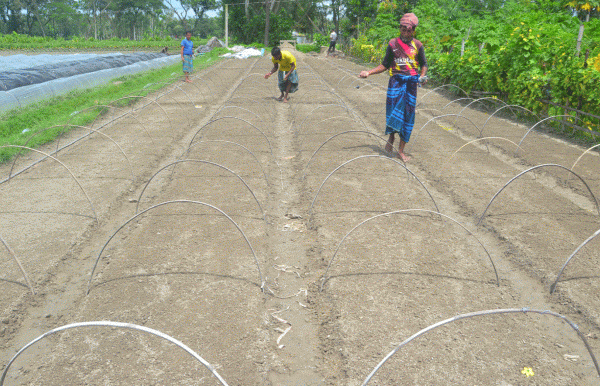Seedlings sprout to transform villages in Bogura
- Update Time : Tuesday, October 15, 2024

A Correspondent, Bogura
Strolling through Shahnagar village in Bogura offers a rare treat for the eyes – fields adorned with polythene sheets protecting tiny vegetable seedlings, and sprawling greenhouses dedicated to a budding industry.
Farmers in this village have wisely traded their rice paddies for seedling production, a far more profitable venture.
What began in the 1980s as a modest effort of a man known in the locality as Shamsu Pagla has now blossomed into an agricultural revolution. Back then, Shamsu tended to his seedlings, selling the surplus at the local market without much fanfare.
It wasn’t until 1985 that a local teen, Amzad Hossain – apparently inspired by Shamsu – decided to cultivate chilli seedlings on a half decimal of land. Realising the profit potential, he quickly discovered that producing seedlings was far more rewarding than traditional crop cultivation.
By 1992, Amzad had expanded his operations to four acres, fully committing to commercial production.
Today a 53-year-old, Amzad has not only transformed his own life but also brought about a wave of economic prosperity to the village. Shahnagar, a village in Shajahanpur upazila of Bogura, is now famously known as “village of seedlings”.
Over 300 nurseries have been established in the area, producing seedlings that are sold all over the country. Every season, seedlings worth approximately Tk40 crore are bought and sold in Shahnagar, according to nursery owners.
Amzad himself has founded an agro-seed business that employs eight people and supplies high-quality vegetable seeds alongside the seedlings. As president of the Shahnagar Nursery Owners Development Organisation, Amzad has observed how seedling production has revolutionised the region’s agricultural economy.
“Many previously unemployed men and women now have jobs. While most of the land used to be dedicated to rice cultivation, it’s now used for seedlings, which are several times more profitable,” he explained.
Famin Hossain, a college student pursuing a degree in mathematics at Government Azizul Haque College, is one of many villagers who have embraced the seedling business.
Famin uses just eight decimals of land to grow vegetable seedlings, earning an annual income of Tk3 lakh to Tk4 lakh. He attributes this success to the high demand for quality seedlings from Shahnagar, noting that almost every farmer in the area is now involved in seedling production.
SEEDLING REVOLUTION EXPANDS
Nearby villages like Baropathar, Chupinagar, and Durlia have also seen a surge in nursery activity. Together, these areas are home to around 300 nurseries spread across 250 to 300 acres.
Every year, they produce seedlings of hybrid crops such as cauliflower, cabbage, tomatoes, eggplants, papayas, and chilli. The growing season for these seedlings typically lasts from the Bangla month of Asharh to Kartik (June to November), with buyers flocking from regions as far as Panchagarh, Barishal, Tangail, and Savar.
Arman Hossain, a local nursery owner, currently cultivates seedlings on two acres of land, with production costs ranging from Tk2 lakh to Tk3 lakh per acre, leaving him with a net profit of the same amount.
“Before the nursery business took off, most of the village relied on rice farming, but now the economy is much stronger,” he said.
Farmers like Moksedul Islam, who switched from rice farming to seedling production, share similar success stories.
“I used to spend about Tk15,000 to cultivate rice on one acre, earning just Tk20,000. If the price of rice dropped below Tk1,000 per maund (37 kg), I would incur a loss. That’s why I switched to seedlings, which are far more profitable,” said Moksedul, who now produces vegetable seedlings on two acres of land.
Local nursery owners estimate that Shajahanpur produces around 30 crore seedlings every year. This season, prices ranged from Tk1,200 to Tk2,000 per 1,000 seedlings, generating an average of Tk48 crore annually.
Amzad Hossain and other nursery owners now produce disease-free, high-yield seedlings by using advanced methods like greenhouse farming, where seedlings are grown in coco peat instead of soil.
GOVT TAKES INTEREST
Amina Khatun, the agricultural officer for Shajahanpur, said there are around 300 nurseries producing vegetable seedlings in Shajahanpur alone.
“These seedlings are distributed nationwide, and we are continuously working to support the farmers and improve their operations,” she said.
As Shahnagar cements its reputation as the largest seedling production hub in Bangladesh, local farmers remain hopeful of an even brighter future.
With advancements in technology and ongoing support from agricultural experts, the village seems poised for continued growth and prosperity in the years to come.












